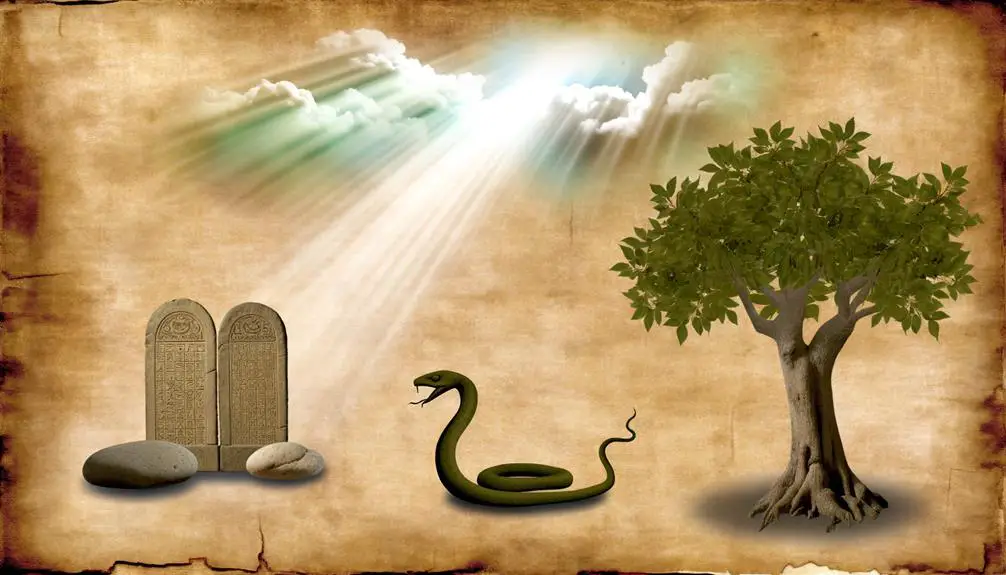Your spiritual journey transforms when you grasp the biblical distinction between 'carnal' and 'spiritual'—discover why.

Meaning of Carnal in the Bible
In your quest to understand the spiritual GPS of biblical times, you'll find the term 'carnal' popping up in numerous passages, especially within Paul's letters. It's a word that straddles two worlds: the tangible flesh and the intangible spirit.
As you explore its origins and how it plays out in both the Old and New Testaments, you'll uncover a dichotomy that has perplexed believers for centuries. This journey into understanding 'carnal' versus 'spiritual' isn't just about definitions; it's about uncovering how these concepts have shaped Christian thought and practice.
So, why is this distinction critical for believers today? Let's find out.
Key Takeaways
- Carnal refers to desires and actions driven by bodily urges, often contrasting spiritual pursuits.
- Biblical narratives use carnality to highlight the struggle between human sinfulness and divine expectations.
- Spiritual growth in the Bible involves transitioning from carnal behaviors to a life aligned with God's will.
- New Testament teachings advocate for inner transformation over mere adherence to external religious practices.
Origins of 'Carnal

Tracing back to its Latin roots, 'carnal' derives from the word 'carnalis', which means 'of the flesh', highlighting its deep historical ties to physicality and earthly desires. This etymology isn't just a linguistic footnote; it's a cornerstone for understanding how 'carnal' has been perceived through ages, shaping its interpretations in various cultural and religious contexts.
The term 'carnal', with its foundation in 'carnalis', serves as a linguistic mirror reflecting society's evolving attitudes towards the physical versus the spiritual realms. Historically, the word carried a neutral connotation, simply describing something related to the flesh or the body. However, as you dissect its journey through time, it's evident that 'carnal' has been imbued with moral and ethical dimensions, particularly in religious texts where it often contrasts with 'spiritual' or 'divine'.
This dichotomy isn't accidental but is deeply rooted in the cultural perceptions of the time. Societies that valued asceticism and spiritual purity began to view 'carnal' desires with suspicion or outright condemnation, projecting a dualism that has resonated through centuries. You reflect on this transformation, considering how the original, neutral meaning of 'carnal' was eclipsed by these cultural overlays, complicating its interpretation.
Carnal in Paul's Letters

In Paul's letters, the term 'carnal' emerges as a pivotal concept, intricately weaving the physical with the moral to challenge early Christian communities. Paul's transformation from a persecutor of Christians to a cornerstone of the faith profoundly colors his narrative, where 'carnal' often serves as a bridge between the earthly and the divine. His audience, primarily Gentile, needed guidance to navigate the complexities of a new faith that was deeply rooted in Jewish tradition yet radically inclusive in its outreach.
Reflecting on Paul's usage of 'carnal', you'll find it's not just a matter of flesh but a battleground of spirit:
- The dichotomy of flesh and spirit: Paul presents 'carnal' as the antithesis of spiritual life, urging believers to transcend their baser instincts.
- Moral imperatives for Gentile converts: He emphasizes moral transformation, indicating that adopting a spiritual lifestyle is imperative for salvation, especially for his Gentile audiences unfamiliar with Jewish law.
- A tool for community discipline: The term is also used to address issues within the community, highlighting the need for unity and purity amidst diverse backgrounds.
- A reflection of internal struggle: Through 'carnal', Paul articulates the internal conflict between earthly desires and divine will, a theme that resonates deeply with his readers, then and now.
Paul's nuanced approach to 'carnal' underlines the complexity of the human condition, inviting followers into a deeper, more introspective faith journey. This exploration reveals not only the challenges faced by early Christians but also offers timeless insights for contemporary believers navigating their spirituality in a complex world.
Carnal Versus Spiritual

As you explore the contrast between carnal and spiritual dimensions in biblical teachings, it's crucial to understand the defined nature of carnality and its implications on one's spiritual journey.
Insights into spiritual growth underscore the transformative path from a life led by carnal desires to one guided by spiritual enlightenment.
The distinction between carnal and spiritual lives highlights a fundamental biblical dichotomy, inviting a deeper reflection on personal faith and conduct.
Carnal Nature Defined
You'll find that the Bible contrasts the carnal nature, rooted in human desires and sin, with the spiritual nature, oriented towards God and righteousness. This delineation serves to highlight the tug-of-war between our base, earthly aspects, and our aspirations toward a divine, moral existence.
- Human instincts often drive the carnal nature, prioritizing self over spiritual duty.
- Bodily functions can dominate one's life, overshadowing spiritual pursuits with temporal desires.
- The pursuit of material wealth and pleasures typifies the carnal mindset, detaching individuals from deeper, spiritual meanings.
- Carnal nature is marked by a resistance to divine influence, favoring immediate gratification over lasting spiritual fulfillment.
Reflecting on this dichotomy encourages introspection about where our priorities lie and challenges us to seek a balance that honors both our earthly and spiritual callings.
Spiritual Growth Insights
Having explored the defining characteristics of our carnal nature, it's crucial to examine how spiritual growth can emerge from this battleground of desires, urging us toward a deeper communion with the divine. This journey hinges on embracing inner transformation, a metamorphosis that transcends mere behavioral adjustments to foster a profound realignment of our values and priorities.
Faith practices serve as the scaffolding for this transformative process, offering structured opportunities for reflection, repentance, and renewal. Through prayer, meditation, and the study of scripture, you engage in an ongoing dialogue with the divine, seeking guidance and strength to overcome the pull of carnality.
This path isn't linear or easy, yet it's marked by gradual, discernible progress toward spiritual maturity, reflecting a deepening relationship with the divine.
Carnal Vs. Spiritual Lives
In the spiritual journey, one must discern between carnal and spiritual lives, recognizing that this distinction plays a pivotal role in the pursuit of divine alignment. The carnal life, often guided by fleeting desires and material pursuits, contrasts starkly with the spiritual life, which seeks connection and meaning beyond the physical realm.
- *Physical discipline* isn't merely for bodily health but a step towards mastering desires that tether you to the carnal.
- *Mindful meditation* serves as a bridge to spiritual awareness, quieting the noise of carnal distractions.
- Embracing humility counters the ego's carnal dominance, fostering spiritual growth.
- Acts of selfless love transcend carnal self-interest, aligning actions with spiritual virtues.
Navigating this dichotomy requires mindful intention and discipline, guiding you towards a life of deeper spiritual fulfillment.
Old Testament References

As you explore the Old Testament, you'll encounter numerous instances where carnal desires and sins are outlined, providing a foundational understanding of human nature's challenges.
These biblical narratives not only define what constitutes carnal behavior but also offer vivid examples of its consequences.
Reflecting on these passages prompts a deeper consideration of the intricate relationship between spiritual directives and human instincts within scriptural contexts.
Carnal Desires Defined
Throughout the Old Testament, 'carnal desires' are frequently depicted as impulses that lead individuals away from spiritual fulfillment and towards earthly, material gratification. These desires often stand in contrast with divine commandments, challenging believers to choose between fleeting pleasures and lasting spiritual integrity. Two key areas where this struggle is evident are:
- Dietary restrictions: The laws presented, particularly in Leviticus, serve not just as health guidelines but as measures to distinguish the faithful from the profane, urging restraint over indulgence.
- Sexual ethics: Scripture outlines moral boundaries concerning sexuality, emphasizing purity and the sanctity of marriage.
This framework of carnal desires:
- Encourages self-discipline
- Highlights the conflict between flesh and spirit
- Demands a choice between temporal satisfaction and eternal values
- Reflects on the broader theme of obedience to God's will
Carnal Sin Examples
Building on the understanding of carnal desires, we now explore specific examples of carnal sin found in the Old Testament, shedding light on the profound consequences they entail for individuals and communities alike.
The narrative of Sodom and Gomorrah epitomizes the extreme of sinful indulgence, where unrestrained carnal desires lead to the cities' destruction, serving as a stark warning against moral decay.
Similarly, the story of David and Bathsheba illustrates how even the most devout can fall prey to carnal temptations, resulting in devastating personal and societal fallout.
These accounts underscore the Old Testament's cautionary stance on allowing carnal desires to dictate one's actions, emphasizing the importance of self-control and adherence to divine commandments to avert moral and spiritual decline.
New Testament Insights

In examining the New Testament, one finds that the concept of 'carnal' is intricately linked with the spiritual and moral dichotomies faced by early Christians. This depth of exploration reveals how believers navigated their faith amidst the contrasting worlds of flesh and spirit. The teachings of Jesus and the perspectives of Gentiles significantly influenced this understanding, illustrating a transition from traditional Judaic interpretations to a more inclusive Christian doctrine.
- Jesus' Teachings: Central to the New Testament is the emphasis Jesus places on the heart's purity over external observances. He challenges the carnal tendencies of pride, greed, and hypocrisy, advocating for a spirituality that transcends mere physicality or ritual compliance.
- Gentile Perspectives: The introduction of Gentile Christians into the early church brought about a vital dialogue regarding the law, grace, and morality. This cross-cultural exchange enriched the conversation on what it means to live a life not governed by the 'carnal' but led by the Spirit.
- Paul's Letters: Paul extensively addresses the carnal versus spiritual battle within the believer, particularly in his letters to the Corinthians and Romans. He delineates the destructive nature of carnality—envy, strife, and division—while urging a pursuit of spiritual virtues.
- Contrast with Judaic Laws: The New Testament narratives often juxtapose the rigidity of Mosaic Law against the liberating truth of the Gospel, where faith and the Holy Spirit's guidance offer a new path away from the carnal mind's death towards life and peace.
Reflectively, the New Testament insights on 'carnal' uncover a profound theological shift, emphasizing inner transformation over external adherence, a pivot pivotal for early Christian identity formation and ethical living.
Implications for Believers

Exploring the New Testament's nuanced perspective on carnality sheds light on how believers are called to navigate the complexities of spiritual life. This journey is not merely about shunning physical desires but involves a profound exercise in moral discernment, grappling with the ethical implications of one's actions in the light of faith.
As you delve deeper into your spiritual path, you'll find that the New Testament doesn't offer black-and-white answers but encourages a thoughtful examination of how carnal desires can misalign with spiritual goals. It's a call to reflect on your motivations, to discern whether actions stem from selfish desires or a genuine pursuit of spiritual well-being.
Aspect of Life |
Implications for Believers |
|---|---|
Personal Relationships |
Nurturing relationships that honor spiritual values rather than purely physical or selfish interests. |
Material Possessions |
Adopting a stance of stewardship and generosity, recognizing the temporal nature of material wealth. |
Ethical Decision-Making |
Making choices that reflect a commitment to spiritual principles, even when faced with societal pressures to conform to secular norms. |
Self-Reflection |
Regularly examining one's motives and desires to ensure they align with a life led by the Spirit rather than by carnal impulses. |
This table encapsulates the essence of navigating life as a believer, where every aspect demands a balance between spiritual aspirations and earthly realities. The challenge lies in constantly aligning your actions with your faith, ensuring that your choices bear witness to the transformative power of living a life guided by spiritual principles rather than by the fleeting allure of carnality.
Overcoming Carnality

Overcoming carnality requires a deliberate and conscious effort to align one's desires with spiritual values, challenging though it may be. This pursuit isn't merely about abstaining from fleshly desires, but rather, it's a profound journey towards inner transformation and spiritual enlightenment. At its core, this process demands a relentless quest for self-awareness and a deep commitment to evolving beyond mere surface-level existence.
To embark on this transformative journey, consider adopting the following strategies:
- Engage in mindful meditation: Regular meditation fosters a heightened state of awareness, enabling you to observe your thoughts and emotions without judgment. This practice can help you identify carnal desires and understand their transient nature.
- Seek behavioral transformation: It's not enough to recognize carnal tendencies; you must also commit to altering your behaviors. This might mean setting boundaries, cultivating new habits, or seeking accountability from trusted individuals in your spiritual community.
- Immerse yourself in spiritual texts: The wisdom found in sacred scriptures can offer guidance and insight as you strive to align your life with higher spiritual principles.
- Participate in a community of faith: Surrounding yourself with like-minded individuals can provide support, encouragement, and practical advice as you navigate the challenges of overcoming carnality.
This path towards spiritual maturity is intricate and fraught with obstacles, yet it's immeasurably rewarding. By integrating mindful meditation and behavioral transformation into your daily routine, you're not just eschewing carnal desires; you're cultivating a life of purpose, fulfillment, and profound spiritual connection.
Frequently Asked Questions
How Has the Interpretation of 'Carnal' Evolved in Christian Theology Outside of the Biblical Texts, Particularly in the Writings of Early Church Fathers and Medieval Theologians?
You're delving into how 'carnal' has been reinterpreted over time, especially by early church fathers and medieval theologians. These shifts often intertwined with Gnostic interpretations and philosophical dualism, reflecting a nuanced evolution.
As you explore, you'll find that the term's transformation was deeply influenced by a desire to reconcile spiritual ideals with earthly existence. This journey through theological thought reveals a complex dialogue between body, spirit, and morality.
Are There Any Notable Differences in How the Concept of 'Carnal' Is Understood and Applied in Various Christian Denominations Today, Such as Catholicism, Protestantism, and Eastern Orthodoxy?
Today, you'll find that denominational debates intensely scrutinize the concept of 'carnal.' Specifically, discussions vary across Catholicism, Protestantism, and Eastern Orthodoxy.
While Catholics might emphasize historical teachings on carnal sins, Protestants often focus on personal conviction and scripture.
Meanwhile, Eastern Orthodoxy offers a unique perspective, blending spiritual with traditional views.
Carnal rituals, too, are viewed under differing lights, shaping how each denomination understands and applies these teachings in a modern context.
How Do Contemporary Psychological and Sociological Perspectives on Human Nature and Behavior Influence the Understanding of 'Carnality' Among Modern Christians?
You're navigating a complex landscape where evolutionary psychology and cultural relativism shape your understanding of carnality. These contemporary perspectives offer a lens through which you perceive human nature and behavior, influencing your grasp on carnality.
As you reflect on these insights, you recognize how they mold modern Christians' views, intertwining with traditional beliefs to form a nuanced comprehension of carnality that's both analytical and reflective, grounded in today's societal norms.
In What Ways Has the Concept of 'Carnal' Been Represented or Depicted in Christian Art and Literature Throughout History?
You'll find that throughout history, Christian art and literature have vividly represented the concept of 'carnal.'
Take, for example, Renaissance depictions, where artists skillfully used symbolic colors to convey messages of carnality and spirituality. These visual cues often reflected societal and theological views, pushing observers to reflect on their own behaviors and beliefs.
This approach not only enriched the visual culture but also deepened the understanding of human nature within a Christian context.
What Are the Practical Implications of the Biblical Teachings on Carnality for Christians Living in a Highly Digital and Secular Society?
You're navigating a world brimming with digital asceticism and secular temptations, a challenge for those striving to live by biblical teachings on carnality.
It's crucial to critically assess how you engage with modern technology and societal norms. Reflecting on your actions and choices becomes essential, guiding you to a balanced life that aligns with your spiritual values.
This pursuit requires deliberate effort to resist contemporary pressures, fostering a deeper connection with your faith.
Conclusion
In conclusion, you've seen how 'carnal' in the Bible signifies more than mere physicality; it embodies a deeper spiritual struggle. You might argue that human nature can't transcend its fleshly desires, yet Paul's letters offer a roadmap for spiritual growth, urging believers towards a life less governed by carnality.
Reflecting on this, it becomes clear that overcoming carnality isn't an insurmountable task but a transformative journey, inviting a closer walk with the divine. This understanding not only enriches personal faith but aligns actions with spiritual values, fostering a life that truly reflects the teachings of the scriptures.



Sign up